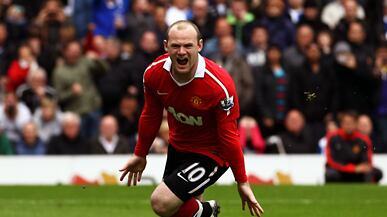They call us scum, parasites, the lowest of the low. They tell us our faith is fake. But there are millions of us in Asia, America, Africa, even London, and we have our own story to tell. We are the legions who make the Manchester United soccer club the most supported and, with a valuation of $1.84 billion, wealthiest sports club in the world—but we’ve never set foot in Manchester. We suffer for our belief: we’re derided by both the opposition and local Manchester United fans.
This Saturday over 200 million people will watch Manchester United play Barcelona in the Champions League final, the most important soccer game of the year—an event which has outstripped the Super Bowl as the world’s most watched annual sports event. Our hearts will be in our mouths, even if we didn’t grow up under the eaves of Manchester United’s stadium. Why do we care? What makes Manchester United, a team with only an average record in international competitions, so important to so many? Why do I, a Londonized Russian with American family, support Manchester United?
It starts with tragedy. In February of 1958, in Munich on a refuelling stop, a plane carrying the Manchester United team returning from a game in Belgrade skidded off the runway while attempting takeoff in awful weather. Most of the team were killed. The manager, Matt Busby, and a young player called Bobby Charlton, were among the few who survived. The team of 1958 hadn’t won any international competitions, but they were cavalier and dashing, like rock stars or Romantic poets cut off when they were just potential. Thus the world’s emotions were first pricked by Manchester United: soccer literally became a matter of life and death.
ADVERTISEMENT
It took 10 years for Busby to grow another great team. Charlton was part of it, and in 1968 they won the European Cup. So the Manchester United story became one of death and glorious rebirth. And 1968 was a fortuitous year to become European Champions: it was the year that defined an age. The players of ‘68 became intertwined with the year’s history: George Best, Martin Luther King, Bobby Charlton, Alexander Dubcek, Jimi Hendrix, Denis Law.
Every soccer club offers its own emotional package, but only Manchester United offers the greatest one there is: death and rebirth.

For the next three decades the team lay fallow, promising much, achieving nothing. Only the memory of death, rebirth and ’68 kept the club dear to people. Managers came and went, but Manchester United was waiting for someone who matched the measure of its emotional range. Then it found him: an obsessive, cobalt-blue-eyed Scot by the name of Alex Ferguson. In 1985, a year before Ferguson followed the call to manage Manchester United, he’d stood on the touchline next to his mentor, Jock Stein, a great manager in his own right, and watched hopelessly as Stein seized up and died of a massive heart attack right by the side of the pitch during an international game. I remember watching the match as a small child on television: the close up of Stein’s stricken, paralyzed face; the disorientation of lethal seriousness invading the space of what was “just a game.” So Ferguson knew first-hand that soccer is a matter of life and death: he understood Manchester United.
Today he has made the club great again. His crucial victories all come the same way: glory snatched from the grave of defeat. Impossible last-minute comebacks, penalty shoot-outs won that looked lost. “They seemed dead and buried, but never write off Manchester United” goes the chorus of commentators, year after year, surprised as if it’s some sort of accident. It’s not: it’s the essence of Manchester United. Every club offers its own emotional package, only Manchester United offers the greatest one there is: death and rebirth.
But these are generalities: every one of us parasites has his or her own path into the faith. Mine is the following: I was 4 and my parents had just fled to Britain from the Soviet Union. I knew no English. I had no friends at school. The only way I could communicate with my first classmates was playing football. Andrew was the best player. I wanted to be his friend. He supported Manchester United. I copied him. Later he would switch allegiances, frustrated at the chronic failures of the Manchester team of the early '80s. He wouldn’t be my friend either: he didn’t want to hang out with the foreign boy at school. The one time he came around his parents stood awkwardly on the doorstep, unable to force themselves over the threshold into my parents’ émigré world.
But my love for Man U stayed. I learned English by reading soccer magazines, and collected stickers of the Manchester United team, little icons that I plastered round my room. The players looked out at me, supportive and sympathetic. There was Mike Duxbury, a right back with an ever-so-slightly crooked eye: he seemed to say that if he could defeat his physical deformity, I could overcome my cultural and linguistic ones. There was Jesper Olsen, a Danish winger with the face of a frightened rabbit: one of the few foreign players in England in those years, Jesper shared my sense of otherness in this closed, gray, wonderful country. The history of sport has little time for these players, but they helped me survive the strangeness of immigration, and I am forever grateful to them.
This Saturday, when, hands clammy with nerves, I watch the final, I will not seek the company of “real” Manchester United fans who doubt me, nor will I search for other “sham” fans (we are uncomfortable in each other’s presence). I will watch alone, whispering “thank you” to Mike Duxbury and his slightly crooked eye, praying hard for victory.
Peter Pomerantsev is a television producer and nonfiction writer.






